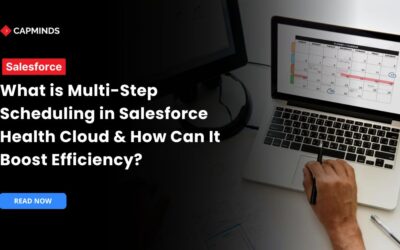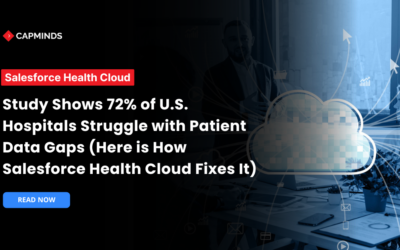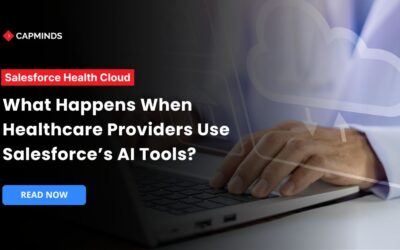How to Build a Patient-Centric Healthcare CRM with Salesforce Health Cloud
The healthcare industry is evolving rapidly with new patient expectations emerging daily. A recent study found that 92% of patients prefer personalized messages. This demand highlights the growing need for better patient communication systems. Meanwhile, the U.S. healthcare CRM market will reach $28.62 billion soon. It is expected to grow 10.12% per year until 2033. This growth shows how hospitals are improving patient management with technology.
One effective tool for healthcare organizations is Salesforce Health Cloud. This platform helps doctors and nurses streamline patient care operations efficiently. In this blog, you will learn how to build a patient-focused CRM.
What is Salesforce Health Cloud?
Salesforce Health Cloud is a healthcare CRM software. It is mainly built to assist healthcare professionals in delivering better patient experience. This powerful CRM collects health data from various systems and tools which include:
- Electronic health records
- Laboratory systems
- Patient preference
- Real-time communication tools
- Patient Portal
Salesforce Health Cloud CRM combines all clinical and non-clinical data, giving providers a 360-degree view of patient information. The platform enables real-time integration from various healthcare systems. It also helps automate provider workflow and reduce manual administration work.
Salesforce Health Cloud has an AI tool that helps providers improve their decision-making. Its smart tools also allow healthcare professionals to track patient progress easily.
Key Features and Benefits of Salesforce Health Cloud
Salesforce health cloud CRM has various features and has many benefits for healthcare professionals.
1. Unified Patient View
Salesforce Health Cloud gathers data from different healthcare sources to create a complete patient profile. It creates a single profile that includes:
- Patient Demographics
- Medical History
- Past Treatments and Diagnosis Clearly
By combining all the information, it provides providers with a 360-degree view of patient information. Healthcare teams can instantly access patient details in real-time, helping providers make accurate treatment decisions.
2. Enhance Care Coordination
The platform improves teamwork among healthcare professionals efficiently. It allows healthcare professionals and nurses to share patient updates quickly. This ensures that care teams are always informed about the patient’s condition and treatment progress.
By collaborating in real time, providers can prevent errors and confusion in treatment plans. Healthcare professionals can use shared care plans and task management tools to improve patient care and stay updated.
3. Personalized Patient Engagement
Salesforce Health Cloud allows patients to manage their healthcare journey independently. This powerful software allows patients to access their medical records on mobile or desktop devices. It also has self-service portals that help patients schedule appointments without delays.
Automated reminders in self-service portals consistently improve follow-ups and medication adherence. Personalized support significantly increases patient satisfaction and healthcare involvement.
4. Data Security and Compliance
Salesforce Health Cloud follows strict security guidelines for data protection. The CRM software complies with HIPAA and other important healthcare regulations carefully.
This platform has advanced encryption to protect confidential patient information from cyber threats. Also, Role-based access ensures that only authorized staff access data. Additionally, Audit trails track system activity to prevent unauthorized access.
Related: Top 7 Features of Salesforce Health Cloud You Should Know
Steps to Build a Patient-Centric Healthcare CRM with Salesforce Health Cloud
1. Assessing Healthcare Organization Needs
- Before the implementation of salesforce health cloud CRM, Organizations must evaluate their current systems.
- Healthcare organizations should identify weaknesses in patient communication and data management.
- Without addressing these inefficiencies, workflows may continue to reduce productivity and patient satisfaction.
- A well-integrated healthcare CRM system should solve key challenges in hospital operations.
- Understanding these issues ensures successful CRM implementation for healthcare teams.
2. Integrating Electronic Health Records and Legacy Systems
- Integration of salesforce health cloud CRM and EHR software is important to improve workflow efficiency.
- A well-integrated health cloud CRM and EHR allows real-time data synchronization for better patient management.
- Connecting these powerful systems can ensure reduced manual data entry and improved accuracy.
- As a result, data integration helps providers to access complete patient histories instantly.
- Also, it helps to eliminate data gaps that cause inefficiencies in healthcare operations.
3. Customizing Salesforce Health Cloud for Patient-Centricity
- Organizations should tailor the salesforce health cloud CRM system to match their workflows properly.
- Customizing dashboards and reports allows healthcare practitioners to increase workflow efficiency and provide vital information in an easily accessible format.
- Moreover, tailored rules can reduce repetitive tasks.
- With automated alerts, providers get notified about critical patient conditions quickly.
- Healthcare organizations need to ensure that the system aligns with patient needs and expectations effectively.
Related: 6 Best Ways to Tailor Salesforce Health Cloud to Your Practice Needs
4. Implementing Patient Data Segmentation for Targeted Interventions
- Health Cloud allows segmentation based on different patient characteristics to create more personalized treatment plans.
- With advanced health cloud analytics, providers can classify patients by medical conditions, risk factors, or demographics.
- This segmentation prioritizes high-risk patients to ensure they receive focused attention for better care.
- As a result, Personalized treatment plans improve recovery rates and patient outcomes.
- Data segmentation helps allocate resources efficiently within hospitals.
5. Setting Up Automated Workflows and Case Management for Care Coordination
- Automating workflows within Salesforce health cloud CRM helps to reduce repetitive tasks in hospital management.
- Appointment scheduling becomes faster with automated reminders for patients.
- The case management feature in Salesforce Health cloud CRM helps to track patient conditions more effectively.
- With the help of this tool, healthcare professionals can monitor real-time updates on patient treatments easily.
- Healthcare providers can manage cases more efficiently with structured task assignments.
6. Training and Adoption for Care Teams
- Healthcare teams need proper training before using Salesforce Health Cloud.
- Employees must understand how to navigate the system, enter data, and communicate with patients.
- So, the training sessions should cover every aspect including navigation, data entry, and communication tools.
- Interactive sessions help employees adapt to the new system quickly.
- Also, ensures providing ongoing support to ensure that staff can resolve technical issues.
- The user adoption increases when teams understand the system’s full potential.
Utilize Advanced Features of Salesforce Health Cloud for Better Patient Engagement
1. Unified Patient View for Personalized Care
Health cloud CRM centralizes all information to make it easily accessible. Providers can review test results and treatment histories instantly.
This transparency and real-time update ensures that care teams have the updated information. Gaining better insights about patients will lead to more accurate diagnoses and treatment plans. Offering personalized care to patients improves their overall experience, satisfaction, and health outcomes.
2. Automating Workflows and Document Processing
The platform efficiently automates routine healthcare processes. By digitalizing documents, paperwork burdens decrease, allowing for faster processing of patient records. Automation also significantly reduces errors in medical records and insurance claim processing.
3. Enhancing Interoperability with FHIR APIs
Salesforce Health Cloud CRM supports FHIR APIs, which enable communication between different healthcare software systems and help improve seamless data sharing among them.
This way, healthcare professionals can effortlessly access patient data across multiple hospitals. Standardizing formats also makes the integration between healthcare systems smoother and more reliable.
Salesforce Health Cloud Solution From CapMinds
CapMinds offers a tailored Salesforce Health Cloud solution to address the unique needs of healthcare organizations, ensuring streamlined workflows, improved patient outcomes, and operational efficiency.
With CapMinds, healthcare providers can overcome the complexities of Salesforce Health Cloud and unlock its full potential through:
- We adopt Salesforce Health Cloud to your organization’s specific needs, enhancing functionality and usability.
- CapMinds ensures smooth integration with third-party systems like EHRs, billing systems, and patient engagement tools.
- Our hands-on training empowers your care teams to maximize the potential of Salesforce Health Cloud.
- We provide continuous updates, performance optimization, and issue resolution to keep your systems running efficiently.
- Ensure accurate and secure patient data migration with CapMinds’ expert-led processes.
Why Choose CapMinds?
CapMinds addresses the common challenges of Salesforce Health Cloud, such as bulk data performance issues, extensive customization needs, and integration complexities.
By leveraging pre-configured templates, scalable frameworks, and advanced integration tools, we simplify implementation and customization, ensuring a hassle-free experience for healthcare organizations.
Contact CapMinds to discover how our Salesforce Health Cloud solution can drive efficiency, improve patient care, and help your organization achieve its healthcare goals.
Let us guide you to a seamless care management experience.



